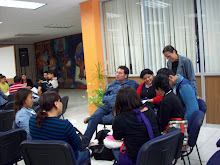
B.A.C.A.: Advocate groups offer support for children
By Matt Smith
msmith@trcle.com
Bikers, mothers and law enforcement officials may seem an unconventional alliance. But representatives from all three are working, separately and together, to raise awareness of and give voice to crime victims.
Four advocacy groups — among many similar groups that operate in the area — situated either in Johnson County or the North Texas region stressed how essential it is to focus on the victims of crimes, inform them of their rights and help them through the legal and healing processes. Police and prosecutors care and try to help victims as much as they can, representatives from all four organizations said.
But they also have new cases to move on to after the initial criminal investigations and trials, which often leaves little time for victim follow-ups. This is where victim’s advocate groups fit in.
Much has been done to increase the focus on and call attention to the rights and plights of crime victims over the last 25 years, group representatives said. But much remains to be done. Representatives from the four area groups and service providers are working hard to ensure it is done.
Bikers Against Child Abuse
Many Bikers Against Child Abuse, or B.A.C.A., members look like the type a person would expect to find brawling in a roadhouse dive on a Saturday night. But they’re men and women with compassion in their hearts whose actions speak volumes. A child who falls victim to a crime of abuse may find that B.A.C.A. members become the best friend he or she has ever had.
A licensed child therapist founded B.A.C.A. in Utah in 1995. From there it spread to several states, including Texas. B.A.C.A. also has chapters in Australia.
“When talking to kids in counseling sessions, he would make headway,” said Jester, state vice president. “But he realized that when the kids were on the street the perpetrator could still hassle them. And he hit on the idea of taking kids for rides with a motorcycle group he rode with.”
Jester and other B.A.C.A. members go by their road names, bestowed when they become full-fledged members of the organization.
“My wife and I call each other by our road names at home,” joked Fort Worth Chapter member Doc-P. “Some of the members, I don’t even know their real names.”
B.A.C.A. members are true bikers, Jester said. They lean toward Harley-Davidsons although some members ride other brands. B.A.C.A. is not a club or gang, Jester stressed. It’s an organization focused entirely on empowering and protecting abused children.
Nor is B.A.C.A. a vigilante group, according to the organization’s Web site.
“We do not search out and hunt down bad guys, nor do we pursue those who are under suspicion of hurting children,” an organizational pamphlet reads.
Still, perceptions and prejudices against biker groups prevails and can be tough to overcome, Jester said.
“The image is a blessing and a curse,” Jester said. “That bad motorcycle image is what works for us. If you’ve got a guy in a suit, or in a polo shirt and khakis telling a kid he’s going to be safe versus a guy dressed up in leather, a dew rag and dark glasses who looks like he could take on half the world, who do you think the kid’s going to trust more?
“The curse is that police and others in areas where we’re not well known think at first that we’re probably just a bunch of bikers out to raise hell every weekend.”
Children, on the other hand, tend to take to B.A.C.A. members quickly.
“When I’m driving my pickup, no one pays attention,” Jester said. “But on my bike, they love me. They’re looking and giving me the thumbs up. Some kids are shy at first, but they warm up and want to play pretty quick.”
Doc-P agreed.
“Sometimes they’re timid at first or hiding behind their parents,” Doc-P said. “But we’ve been trained to get them to open up. And they love the sound and color of the bikes. Soon enough, we’ll be coming to visit them, and they’ll be standing outside waiting when we’re three blocks away.”
Authorities can be standoffish at first, Jester said, but not always.
“They’re heroes to these kids, said Dan Leal, Children’s Advocacy Center of Denton County executive director. “The stereotypes are there and some counties don’t use them, and I really don’t know why.”
Anyone with a motorcycle and a desire to work is a potential B.A.C.A. candidate, but it takes much more than that. Candidates undergo extensive training and background checks. They must also ride with the club and a mentor for a year before receiving their B.A.C.A. patch. Those precautions keep people who shouldn’t be there out of the organization and discourages weekend bikers looking for a thrill who might grow bored and wander off two months later.
“These kids have had promises broken and their trust busted so much that we only want the most trustworthy members who are going to be there for them,” Jester said. “But, we have everything from ditch diggers to doctors and lawyers. So, if you ride a bike, can pass our background check and keep up with us.”
Tank, a Cleburne member agreed.
“We want to know who you are and what you’re in it for,” Tank said. “Besides, there’s just too much work involved for someone who’s only looking to ride for fun.”
Even after being patched, a B.A.C.A. member is never alone with a child, said Trappy, Fort Worth Chapter president. At least two members accompany the children at all times.
“Our goal is to empower the kids so they can be themselves again and not be afraid of the world,” Tank said.
B.A.C.A. only accepts referrals where a police report has been filed and an appropriate agency, such as Child Protective Services, a district attorney or a child advocacy center, has interviewed the child. They then meet and, if all involved agree, adopt the child. (B.A.C.A. members asked that no children be named, photographed or interviewed.)
Adopted children receive vests and their own road names. B.A.C.A. members will guard a child’s home around the clock if that child feels threatened by his or her perpetrator, Jester said.
“We’ll camp out 24/7 as an obstacle to perpetrator,” Jester said. “We don’t go out to look for him, and if he shows up, we don’t go out to meet him. But we will block his way between the house and the kid. By that time the police are usually there anyway because we call anytime a perpetrator does show up.”
B.A.C.A. members don’t involve themselves in the specifics of the case so they can remain in the courtroom when a child has to testify, Jester said.
“We do have an impact in the courtroom,” Jester said. “They can look at their perpetrator where before they were afraid. And testimony, especially in sexual abuse cases, is one of the biggest impacts of putting a perp away.”
Crime victims face challenges long after the crime and trial. For that reason, B.A.C.A. members stay in touch with their adopted children and let them know they continue to be there for them, Trappy said. The group hosts several events throughout the year for their kids, Doc-P said.
B.A.C.A. has helped several children in Johnson County and hosted an adoption ceremony for at least one child. They want to get word out and increase their presence in the county, Trappy said.
Tammy King, Children’s Advocacy Center of Johnson County executive director, praised the organization.
“They’ve been really good about bringing their motorcycles and visiting with the parents and kids,” King said. “The kids sit on the motorcycles, get their pictures taken, get the B.A.C.A. tattoos. So, it’s great fun; they love it.”
On the Web:
http://www.bacausa.com/















